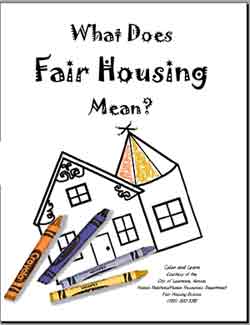 |
| Image Credit: City of Lawrence (KS) |
Earlier today I read Dr. Robert Lerman, American University economist and Urban Institute fellow's fantastic column entitled
"Low-Income Housing Doesn't Actually Exist", which discusses how bad terminology can lead to bad housing policy. Dr. Lerman notes that the inaccurate overuse of the term "low-income housing" has led to policies that rely too much on construction subsidies that restrict where recipients can live, overlook many families living below the poverty line, and do nothing to address the shrinking purchasing power of residents with modest incomes. While I am unsure about Dr. Lerman's suggested paradigm shift from construction incentives to rent vouchers, his words will certainly caution my future framing of affordable housing issues and hopefully inform my future analysis of sources that label units rented or bought primarily by people of lower incomes as "low-income housing."
Note: Since we are discussing housing policy language, I disagree with commenter DanM's aspersions on the use of the less-stigmatizing term "affordable housing." It is precisely the subjective nature of the concept of "affordability" that allows it to be more sensitively incorporated into a particular city's housing discourse and policies. Affordability varies immensely by context, just as the types of affordable housing must vary to fit a municipality's goal of defining its community identity within regulatory limits - a longstanding precept of zoning law.
Further Note: While I read Dr. Lerman's piece on The Atlantic Cities, it originally appeared on the Urban Institute's MetroTrends blog.

No comments:
Post a Comment